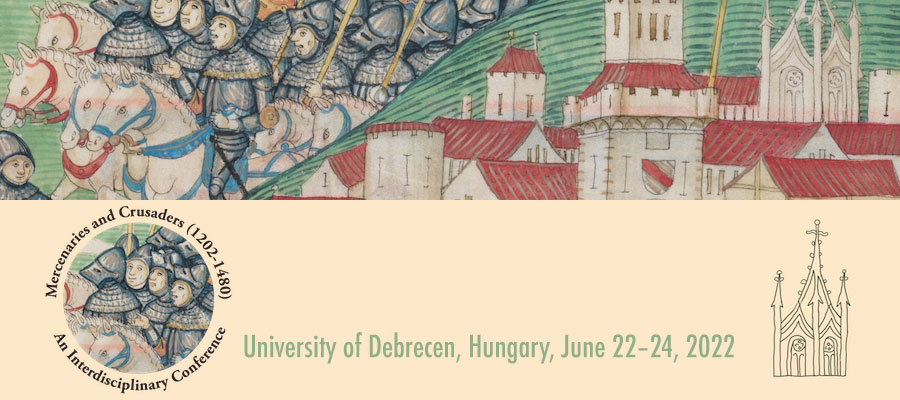Mercenaries and Crusaders (1202–1480s), University of Debrecen, Hungary, June 22–24, 2022
The Hungary in Medieval Europe Research Group at the Department of History, University of Debrecen, the Centre for the History of Society and Culture (CHSC) of the University of Coimbra and the Histoire et Cultures de l’Antiquité et du Moyen Âge (HiscAnt-MA) Laboratoire of the University of Lorraine, Nancy are pleased to announce that the interdisciplinary conference on Mercenaries and Crusaders (1202-1480s) will take place 22–24 June 2022, at the University of Debrecen, Hungary.
Crusades and mercenaries were inextricably intertwined throughout the Middle Ages. Mercenaries were employed in and against crusading armies in all major theatres of war from the Middle East to Poland, particularly between 1202 (the siege of Zara/Zadar) and the 1480s (King Matthias Corvinus’ anti-Ottoman ventures). The history of crusades coincides with that of medieval mercenaries. Medieval mercenaries were the only soldiers for and against whom crusades were organised and conducted in the name of the Lord. To bring forward just a few examples, several popes from Innocent VI to Gregory XII tried to find a way out of the predicament caused by the mercenaries in France and Italy. Captains like Sir John Hawkwood or Arnaud de Cervole were often either excommunicated or recruited in the crusading enterprises in the 1360s. Amadeus VI, the Green Count of Savoy employed mercenaries in his crusade of Gallipoli. The Teutonic order recruited mercenaries from Bohemia, Silesia, and even from the West.
The organisers encourage thematic panels, but individual papers may also be submitted. Each paper – in a panel or independently – will be of a duration of 20 minutes. Panels preferably consisting of three to four papers should ideally include a brief 5-minute introductory presentation of their theme and rationale. All sessions will be followed by a brief discussion.
The conference does not have a specific theme, however, the organisers welcome panels and individual papers that fall under the following topics:
- Mercenaries in the Hundred Years’ War
- Mercenaries in the Holy Land
- Mercenaries in the Baltic Crusades
- Mercenaries in the Iberian Peninsula
- Mercenaries and the Papal State
- Condottieri in Italy
- Crusades against Mercenaries in the Hundred Years’ War
- Mercenaries in Central Europe
- Mercenaries in Byzantine Armies
- Mercenaries in the Crusades against the Ottomans
- Crusades in the Holy Land, the Baltics, the Iberian Peninsula; against the Ottomans
- Crusades against Christians
- Crusades, Crusaders and the Holy See
- Crusades and Crusaders in the Eastern Frontiers of Christendom
- Recruitment
- Ideology and Faith
- Tactics and Strategy
- Supply, Logistics, Equipment
- Impact of Crusaders and Mercenaries` Armies on Non-Combatants
- Artillery and Engineers
- Siege Warfare and Fortifications
- Perception of Mercenaries in Narrative Literature
We are, however, open to any variations of the general theme.
All interested lecturers, researchers, independent scholars and PhD-students are invited to submit an abstract.
The working languages of the conference are English, French and German.
